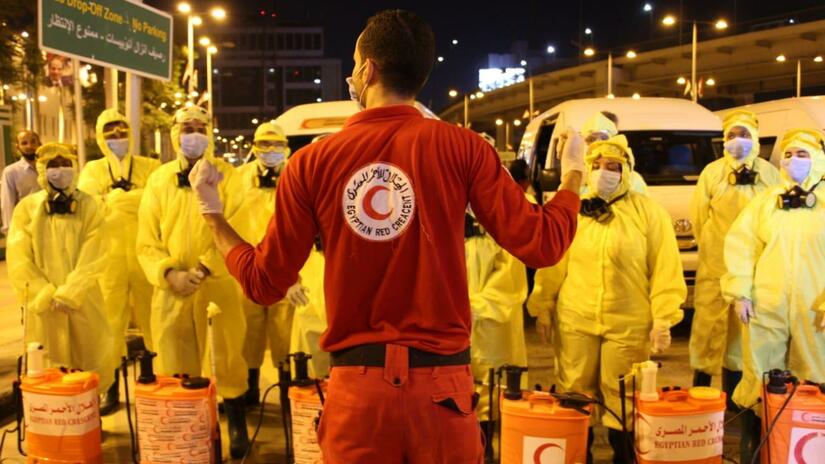Randa El Ozeir: One of the greatest challenges is to live a lonely fortnight on the lookout for your body vital functions undeviatingly, stranded in a tiny apartment situated in a bustling, lively, and populous city.
In a heart-to-heart interview that delved into his story of contracting COVID-19, Mostafa Refaat Nagy, the Youth Representative Board member in the Egyptian Red Crescent Society (ERCS) at Dakahlia Branch and the volunteer in Central Operation Room in the ERCS’ headquarters in Cairo, recounted how the hours of the 14 days passed full of worry and apprehensiveness. “I stayed home with absolutely no human contact for fear of transmitting the infection to others. I spent my time alternating between awakening and slumbering, swept by waves of obsession and frightfulness while monitoring my symptoms’ progress day in day out. Have I had an increase of coughs today? Has my body temperature gone higher? Am I going to wake up to a temperature exceeding 38 degrees Celsius? I measured my temperature three to four times daily. And I was often wondering if what I was experiencing would be considered within the normal range or have things escalated”.
The quarantine period for Nagy in Cairo went by with him isolating himself from his parents and colleagues, exclusively relying on the Emotional Support Team in the ERCS. He said, “I didn’t want to get my parents worried, so I cancelled my weekly visit to their house, as well as refraining from spreading the news among my colleagues in the Society, excluding my superiors. I didn’t want for the colleagues who kept on doing their field missions to be held back by their leader’s infection, namely the younger group. I received a daily follow-up call from the Emotional Support Team that helped me to hang in there. They were my lifejacket, and I know well the primordial role of the emotional state during the isolation. At times, boredom started to take hold of me with their frequent calls, but I was grateful. They saved me from frustration and excessive anxiety and lifted my spirits. Also, they swiftly provided me with prevention measures, such as face masks. It was an extremely awful feeling that I wouldn’t wish it on anyone”.
Even after recovering and going back to work, Nagy feels the scare with every on-the-ground mission. He resorts to his inner voice to regain self-control and leans on protection measures and safety guidelines. He believes that “the team and group spirit strengthens us when we are working with people. My life is devoted to ERCS and I give it my all. With the time, we became more vigilant in our behaviours and actions and left behind any carelessness that puts us at risk. The situation has changed now, and I grew to be more concerned about myself and my team. We certainly know that we are at risk given the nature of our job, even if we get it (contracting the virus) by chance. We realize our true message when serving the people in need, however small that service could be. It is not about delivering aid boxes or sterilizing tools, it is also about offering others a sense of reassurance our uniform radiates whenever we are present”.
In a hindsight, Nagy remembered how the ERCS was prepared for the worst case scenario since the onset of COVID-19. The ERCS, via its Central Operation Room, has embarked on monitoring and tracking the very first cases, including the mild ones. It has focused as well on awareness and sterilizing campaigns, aid interventions, distribution of disinfectants and personal hygiene stuff, and provision of food for the poor communities in the capital city and throughout all the country’s governorates with no exception. He said, “the ERCS visits the hospitals to support the medical teams and deliver thank-you notes. I was able, through my job in the Board at Dakahlia Branch, to closely understand the needs and concerns of the youth volunteers. And I coordinated between the volunteer field teams and the Central Operation Room”.
The ERCS doesn’t have any shortage in the number of volunteers or the individuals who are willing to volunteer. Gearing up the energetic youth volunteers with the indispensable equipment and tools and offering them the required training to properly perform their job are what the ERCS actually need. “There is an increasing demand now with COVID-19 for equipping hospitals and setting field hospitals in many places, such as Al-Fayoum, Ismailia, and Ash Sharqia”, explained Nagy, “we only have one mobile clinic so far, but the situation calls for much more than this. Whatever is available for us, we would need more, particularly to respond to the necessities of the African, Syrian, and other refugee communities. We are perhaps the only party that provides them with services along with the International Organization for Migration (IOM)”.
Article
World Radio Day: How radio helps keep communities healthy and safe
World Radio Day: How radio helps keep communities healthy and safe
| Article

